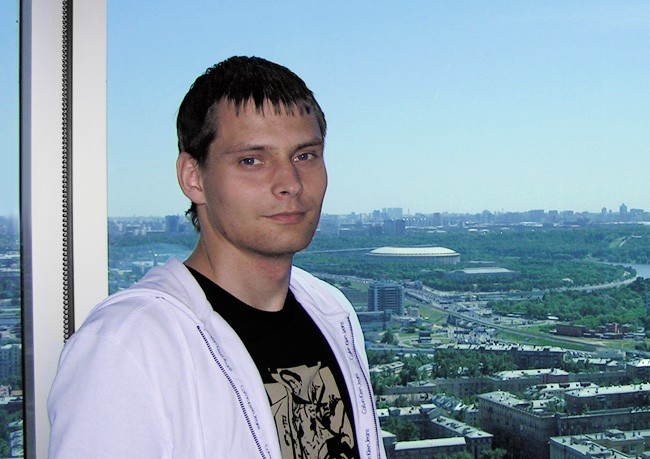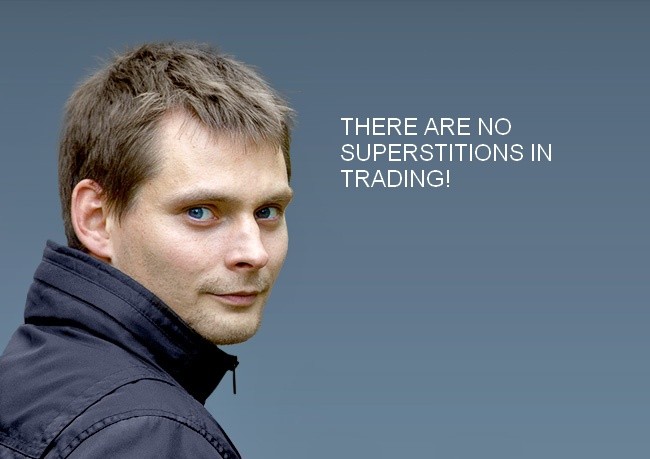Interview with Boris Odintsov (ATC 2010)
Automated-Trading | 21 October, 2010
Interview on Automated Trading Championship 2010 from 21.10.2010.
Boris, please tell us about yourself and your current occupation.
For a long time, I've been working in a military company developing control and navigation systems. In 2009 I completed a postgraduate course in "System analysis and data processing". By the end of this year I'm planning to defend my Candidate's dissertation. My main occupation is somehow similar to financial markets in terms of modeling and process management.
In 2006 my friend introduced me to stock trading. At that time I didn't have any idea of financial markets. Then I started to read books on economics and technical analysis and then to trade on the Russian equity market. I learned about Forex much later.
In 2008 I made my first acquaintance with the MetaTrader 4 platform. I liked its flexibility and wide possibilities. One month later I wrote my first indicator and then my first Expert Advisor. Frankly speaking, my indicator was primitive being based on candlestick analysis of rare patterns. The same principle was used in my EA. It didn't have stable trading. Several times I used in automated trading contests, but I never managed to win - maximum I was in the top three. And of course I never used it on a real account because it couldn't show stable results.
Did you participate in Automated Trading Championships?
No, this is my first championship with MetaQuotes Software Corp. In 2008 I learned about it when it had already started. I was ready to participate in 2009, but it was canceled then. Why I decided to participate this year is first of all the desire to test my applications and, of course, to win the main prize.
I haven't studied all the details of the ATC 2008 results. But I've made
a decision on what the balance level is required to win. Proceeding
from these, I've built my risk management system.

Your Expert Advisor is rather aggressive from the very beginning of the Championship. Can you explain that?
The Expert Advisor uses the principle of refinancing with a specific risk parameter. It uses the principle of fixed percent risk per each deal. And the risk is adjusted to the size of a position. If the balance grows, the position grows together with it. If market changes to unfavorable, the Expert Advisor starts to cut positions, thus reducing the maximal drawdown of the deposit. Now the EA has reached the maximum position size, the percentage risk is not growing but going down.
The EA is designed for long-term operation and includes no other additional settings except the risk ratio.
What market will be unfavorable to you?
The flat and highly volatile market is unfavorable. I haven't included any protection from that, because any additional filters would reduce the efficiency of the system when there is the favorable period.
Would you let your contesting Expert Advisor trade real?
It has been running on a real account for about a year already, though with a much smaller aggressiveness of course. I'm satisfied with its results.
Some Expert Advisors on the Championship use Martingale. What do you think about such money management systems?
I've been always more than skeptical to averaging, bearing in mind the old saying on Russian exchange: "Averaging killed more Jews than the Holocaust".
What is the principle of trading used in your Expert Advisor?
The strategy of my EA is based on tracking if short-term market movements. It is followed by statistical market analysis, modeling and optimization. In this regard I've done a lot of work.
It all starts with a trading concept on paper. Base on the concept I develop an algorithm and then turn it into a program code. It is followed then by numerous attempts to bring the system to the positive mathematical expectation using modeling. At this stage many ideas go to trash. Then I check how stable the system is; i.e. the system should not change globally after small changes of input parameters. Then I set the EA to real mini-accounts to confirm that all calculations are correct. As you can see, it takes much time until an Expert Advisor is finally "released".
Most of the code was taken from the standard libraries of MetaTrader 5. This greatly simplified the process of programming. Actually, the Expert Advisor was modified from MetaTrader 4 in a couple of days.
How does your EA enter the market?
It uses pending limit orders to enter the market. And the price of the limit order is changing dynamically following the current price. The principle of limit order placing is the same - analyzing the short-term trend based on MA.
The five minute timeframe is potentially more profitable, but more risky. Why did you choose it?
First, M5 provides a rather satisfying quality of modeling, because it contains a smaller timeframe M1. Second, to obtain high-quality statistical data you need a large number of trades (in my experience - more than 300), and it's quite hard to get such data on higher timeframes. And third, all timeframes are similar, I do not see any fundamental differences on the riskiness. It's just that each time interval has its own volatility and therefore its specific settings.
You have a balanced ration between winning short and long positions (63% each). How did it happen?
For me the main principle of all Expert Advisors is the universality, i.e. the ability to work in any market phases - bull or market. That's where this balance comes from.
What parameter did you use to optimize your Expert Advisor?
The criterion of optimization is the ratio of profit to relative drawdown. Optimization was performed for all input parameters.
Have you tested your strategy on any other currency pairs?My Expert Advisor is developed specially for EUR/USD - the most liquid currency pair. For other currency other specific parameters and algorithms should be used. Of course, I tried modeling on other pairs, but never achieved results as with EUR\USD.
The LR correlation of your Expert Advisors is close to one. Is it a coincidence or did you have the same smooth balance curve during tests?
The current period is extremely favorable for my EA. In long tests it had phases of corrections and lateral vibrations, like a market trend, but it still continued to move upwards.
Does your EA's behavior now differ much from its performance during tests?
There are differences, but not so large. I can't understand the reason for discrepancy of modeling results in MetaTrader 4 and МetaТrader 5, that's why I use different parameters for these platforms.
What is more difficult to you - to find a strategy or to implement it in a program code?
Of course to find a well-operating strategy. As I've mentioned, a lot
of strategies went to trash. While to implement a strategy in a program
code is not a problem at all.

Was it easy for you to move to MQL5?
In my job, I've been programming in Visual C++ for over 10 years and know object-oriented programming very well. Therefore it was easy for me.
I would single out the following features of the new trading platform:
1) Finally in MetaTrader 5 we have separate notions of orders and positions. Though, at first it was a little confusing.
2) Object-oriented programming. The code becomes clear with it.
3) Modeling. I like the new features that appeared in the new platform.
In different times, different trading strategies like neural networks and martingales were popular. What do you think about such Expert Advisors?
True, there were times when Expert Advisors based on neural networks were very popular. But not all developers know how this network is described. I believe Expert Advisors must be simple and clear. There are a lot of Grails, and most of them lie on the surface. I don't like delving deep into the ground.
As for multicurrency Expert Advisors, I think they are good if trading is well adjusted for each currency pair.
Do you think role of luck is large in trading? What do you think about superstitions in this area?
Luck is certainly important, but only when talking about short time periods. Much attention should be paid to psychology, trading discipline and at the end of that - to the trading strategies. In my opinion, there are no superstitions in trading.
You are now on the top position. Did you count on that before the start of the ATC 2010?
The result is somewhat beyond my expectations. But I think this is because of the favorable combination of circumstances.
What do you think about the participants of this Championship?
Well, I like roadrunna11: the advantage of his strategy, I think, is the minimal risk relative to his profit. Also ShurikAn, whose trading is not very aggressive and quite stable. It's hard to single out someone else, because risks of most of participants are extremely high. Either they leave by stop-outm or their stops are about 200 points.
Thank you for your interview, Boris. Good luck!